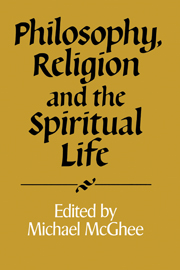Book contents
- Frontmatter
- Contents
- Introduction
- Philosophy and Religion in the Thought of Kierkegaard
- De Consolatione Philosophiae
- The real or the Real? Chardin or Rothko?
- Love and Attention
- Descartes' Debt to Augustine
- Visions of the Self in Late Medieval Christianity: Some Cross-Disciplinary Reflections
- Refined and Crass Supernaturalism
- Religious Imagination
- Moral Values as Religious Absolutes
- Revealing the Scapegoat Mechanism: Christianity after Girard
- Philosophy vs. Mysticism: an Islamic Controversy
- Non-Conceptuality, Critical Reasoning and Religious Experience: Some Tibetan Buddhist Discussions
- ‘Know Thyself’: What Kind of an Injunction?
- Facing Truths: Ethics and the Spiritual Life
- Notes on Contributors
- Index
Introduction
Published online by Cambridge University Press: 04 August 2010
- Frontmatter
- Contents
- Introduction
- Philosophy and Religion in the Thought of Kierkegaard
- De Consolatione Philosophiae
- The real or the Real? Chardin or Rothko?
- Love and Attention
- Descartes' Debt to Augustine
- Visions of the Self in Late Medieval Christianity: Some Cross-Disciplinary Reflections
- Refined and Crass Supernaturalism
- Religious Imagination
- Moral Values as Religious Absolutes
- Revealing the Scapegoat Mechanism: Christianity after Girard
- Philosophy vs. Mysticism: an Islamic Controversy
- Non-Conceptuality, Critical Reasoning and Religious Experience: Some Tibetan Buddhist Discussions
- ‘Know Thyself’: What Kind of an Injunction?
- Facing Truths: Ethics and the Spiritual Life
- Notes on Contributors
- Index
Summary
There is a familiar conceptual slope down which philosophers of a certain temper slide when they come to the analysis of religion, and perhaps they do so on purpose, because we like to bring the discussion round to what we can talk about, and if we are sufficiently dominant we become the ones who define what it is proper to say, though the consequence be the stilling of other voices, who may have spoken with understanding.
The philosopher slides from ‘religion’ to ‘religious belief’ and from that to ‘belief in God’, and the latter becomes, imperceptibly, ‘belief in the existence of God’, so that philosophical reflection about religion is transformed without a pause into reflection on the existence of God, and questions about the rationality of belief, the validity of the proofs, and the coherence of the divine attributes cannot be far behind. It would be absurd to deny the historical importance of natural theology, but there is an established, though slippery, methodology that causes the slide, one that connects natural theology to a certain picture of the procedures that render religious engagement rational or otherwise. The issue, however, is whether such preoccupations should remain central to the philosophy of religion, and, if not, what should replace them.
The silent assimilation of questions about ‘religion’ to questions about ‘belief in the existence of God’ has already by-passed the Buddhist tradition, which is, in many of its phases, ‘non-theistic’.
- Type
- Chapter
- Information
- Philosophy, Religion and the Spiritual Life , pp. 1 - 8Publisher: Cambridge University PressPrint publication year: 1992



